Can Dogs Live on Vegetarian Diet
Can you feed cats and dogs a vegan diet?
(Image credit:
Getty Images
)
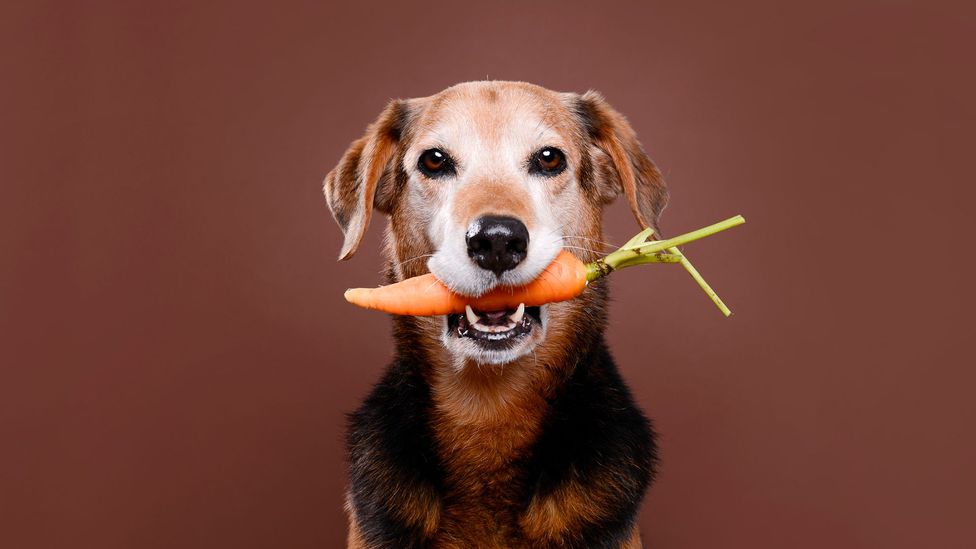
Some vegan pet owners don't just want to give up animal products – they want their pets to as well. But can cats and dogs really go meat free?
In June 2016, a Tumblr blog user named sfveganyogi posted a picture of the dinner she was about to serve her Labrador, Maggie.
"On the menu for Maggie tonight is pureed sweet potato, pureed brown rice, sprouted organic tofu, chia seeds, and digestive enzymes. Does she look excited? She is!"
Maggie, it turned out, was probably rather less excitable about her meal than a large number of internet users who responded to the post. Many were incensed that a dog owner could decide to feed their pet pureed root vegetables and tofu instead of the meat-based treats they usually wolf down with such gusto.
The post – and especially one response to it that pointed to the dog's apparent listless appearance – went viral. The vegan blogger in question eventually abandoned her account.
More The Vegan Factor stories on BBC Good Food
- A balanced diet for vegans
- Is a vegan diet better for the planet?
- What not to say to a vegan
As veganism has risen – according to recent research it rose 600% in the US alone between 2014 and 2017 – so has the idea of feeding our companion animals something other than offcuts from the meat industry. The carbon footprint from pet food is considerable. In 2017 it was estimated the carbon emitted from meat consumed by animals was responsible for dumping the equivalent of around 64 million tonnes of carbon dioxide into the air every year – the equivalent of driving 13 million cars for a year.
That figure only explains the carbon emitted by animals that end up in pet food – on top of that is the water used to grow crops that they are fed, their drinking water, the forest cleared to create their grazing land, and the yet more land and water polluted by their waste. As our pet population grows – domestic animal ownership is increasing in countries like China, for example – and pet owners turn to food aimed as much for human aesthetics as it is animal nutrition, that footprint is likely to only get bigger. In 2017, the scientific journal Plos One published a paper which estimated that the US's cats and dogs ate the calorific equivalent of the diet of 63 million Americans.
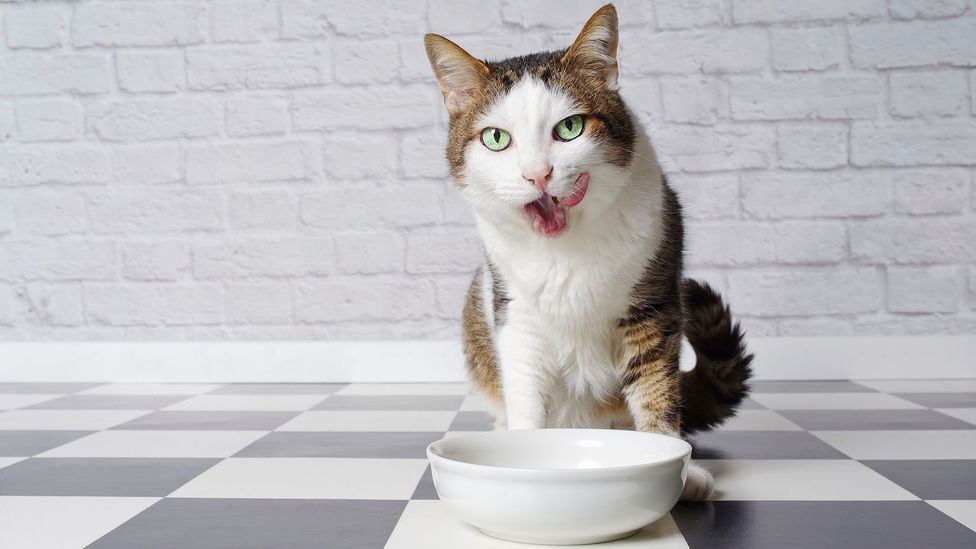
Without essential amino acids such as taurine, cats can die (Credit: Getty Images)
It has led some to wonder whether our cats and dogs can give up meat, or go completely vegan?
Aside from the black-and-white nutritional facts, a pet owner's personal views can come up against specific legislation designed to protect pets' welfare. "In the UK, under the Animal Welfare Act the owner has the obligation to feed the animal an appropriate diet," says Daniella Dos Santos, the president of the British Veterinary Association (BVA) "If your personal belief system means you don't want to eat any animal protein, that's fine, but that diet is not designed to meet the welfare standards of your pet.
"Cats are obligate carnivores, and they require certain amounts of amino acids to be healthy, and the lack of these can lead to health problems," says Dos Santos. "For that reason, you wouldn't advise a vegetarian diet, let alone a vegan one."
Cats are a particular challenge because they cannot produce certain proteins – such as taurine – themselves. They instead have to absorb it from their food, with beef, chicken and fish being particularly rich sources. Cats that don't have enough taurine are at risk of developing a potentially fatal condition called dilated cardiomyopathy (DCM), the American Society of the Prevention of Cruelty to Animals (ASPCA) says.
In cats with DCM, the heart muscle becomes very thin and weak, preventing them from pumping blood and supplying oxygen to the body normally. This is a fatal disease if not corrected early on," the ASPCA says in an article on cats and vegan diets. Cats need a diet particularly rich in protein, which can be more difficult to find with a plant-rich diet, and they can have issues processing carbohydrate as well. "They can't digest plant material well, and they require essential nutrients that only meat can provide to them," the ASPCA adds.
That hasn't stopped some companies from creating vegan cat food. One such company is Ami, based in Italy, which sells vegan cat food that has been fortified with taurine and other essential proteins. But the general consensus from all but a handful of vets is that cats are unlikely to thrive on a diet without meat.
But what about dogs? Here, the science seems to be a little more nuanced.
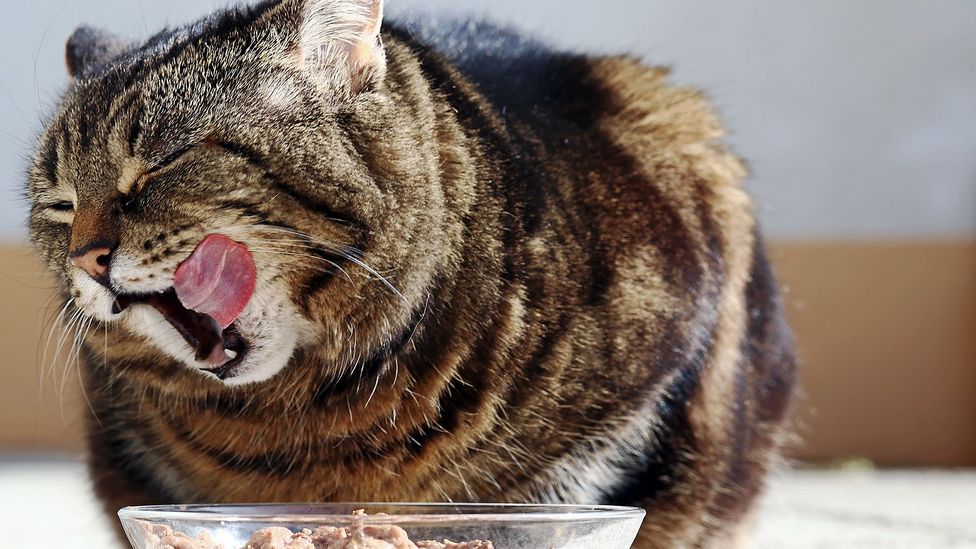
Some companies have created vegan cat food, but most vets say cats are unlikely to thrive on a meat-free diet (Credit: Getty Images)
Part of the reason dogs went from the wild to becoming our companions was because of the food that was offered if they came closer to the campfire. That food wasn't always meat.
In the wild, wolves obviously do eat meat, but they are also known to eat eggs, berries and even grass if vitamins are lacking. Dogs may have adapted to a diet with less meat and more plant starch. Crucially, they have amylase genes which means they can digest plant starch – an adaptation that may have developed as they ate the scraps left for them around prehistoric campfires.
That means dogs are arguably at an advantage when it comes to potentially moving them to a meat-free diet. But Dos Santos, president of the British Veterinary Association (BVA), warns it is not that simple.
"It is theoretically possible to feed a dog a vegetarian diet, but it's much easier to get it wrong than to get it right," she says. "You would have to do it under the supervision of a veterinary-trained nutritionist."
But there are certainly some who are rising to the meat-free dog food challenge.
Wild Earth is one of them. It was co-founded by Ryan Bethencourt, a scientist who had been heavily involved in "future food" start-ups such as Memphis Meats and Gelzen.
Bethencourt was inspired to create an animal product-free food partly because of a series of recalls, some of them because of high levels of contaminants, in the US. "In 2018 we had 100 million units of pet food recalled, partly because some had very high levels of a euthanasia drug, pentobarbitol."
Bethencourt said further research showed him that a lot of pet food was made from animal byproducts that did not have to meet the same strict standards as those intended for human consumption. He was also worried about the growing carbon footprint of pet food – as pet numbers rose, so more animals had to be bred to feed them. "In San Francisco, there's thought to be more dogs than kids," says Bethencourt, who lives in California. "No one took this idea seriously. There was no Impossible Burgers or Memphis Meats."
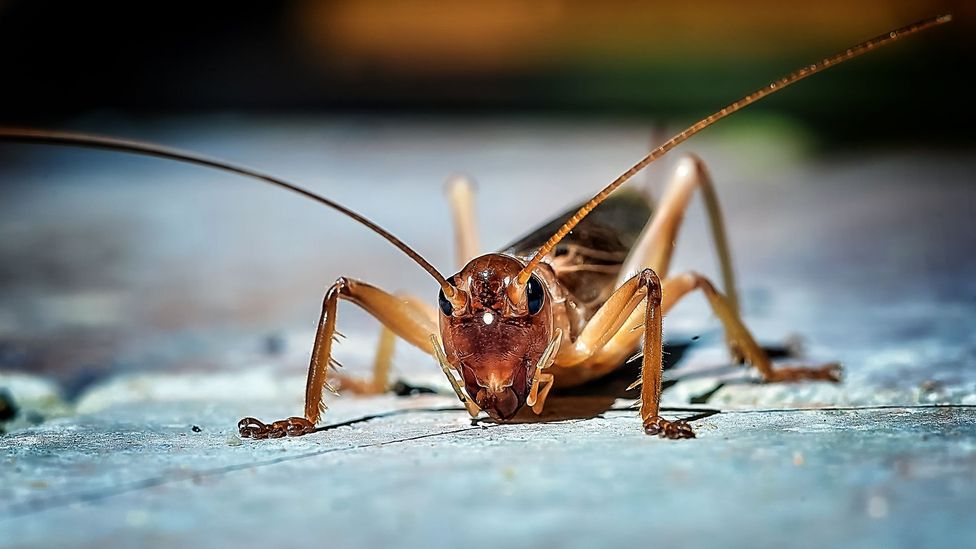
Chippin's Haley Russell says crickets contain all 10 essential amino acids dogs need (Credit: Getty Images)
Bethencourt initially tried to drum up enthusiasm for someone else to act on it, but found no takers. "If you can't find someone to do it, you realise you might have to be that person instead," he says.
Bethencourt and his co-founder, Ron Shigeta, officially launched Wild Earth in March 2018. He says that he always intended the food to be a complete diet, not a supplement. "The first criticism of plant-based diets is that they're low protein, so we wanted to make sure that it was a high-protein food."
The kibble, which you can buy online, contains all manner of plant-based ingredients, including marine algae (which Bethencourt says is rich in essential fats). It also has yeast. "A big ingredient is yeast. When you look at biomass, yeast is about 40% protein, and in a good steak it's about 30%," he says. Then there's other fungi – specifically koji, which is a fungus which grows on wheat. Bethencourt say: "Fungi cells are far more closely related to animal cells than they are to plants." The other benefit to fungi is that it can add a "meaty" umami taste, which the dogs enjoy.
Those who hesitate to feed animals a completely plant-based diet – but who still want to bring the carbon footprint down – might have other options, however.
The pet food company Chippin was founded by Haley Russell and Laura Colagrande. While studying at University of Pennsylvania in Philadelphia, the pair stumbled upon the extraordinary nutritional make-up of their pet food's most notable ingredient: crickets.
Crickets are a food resource well worth turning to. Already, millions of people – mostly in east Asia – eat crickets as part of the daily diet. According to the Food and Agriculture Organization, insects such as crickets are a particularly good form of alternative protein.
Crickets are up to 65% protein by weight, and are also rich in unsaturated fat, dietary fibre, vitamins and minerals.
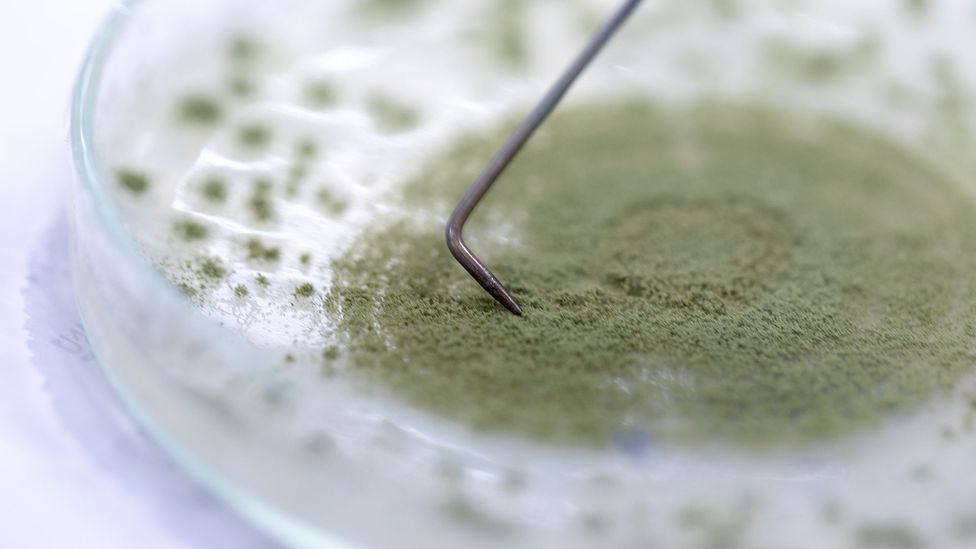
Wild Earth's dog food includes fungi such as koji, which helps give it a meaty taste (Credit: Getty Images)
Crickets have very real benefits when it comes to sustainability, too. It has been calculated that beef cattle need 8g of feed in order to grow 1g of protein – whereas insects only need 2g to create 1g of protein. Crickets also require much less water, which is already an increasing concern to farmers in many regions.
"It gives you all 10 of the essential amino acids your dog needs – they're the 10 building blocks your dog can't make itself without," says Russell. "And dogs love the taste of crickets. We wanted to create a food that was healthy and delicious but also nutritious.
"It was all about finding ingredients that deliver on the health and taste mandate but also contain something that helps with sustainability."
Crickets do not emit methane, a potent greenhouse gas, and produce much less agricultural runoff, which can pollute water courses and arable land. "From a runoff perspective, crickets are really appealing because they don't have the same manure management issue," Russell says.
In an investigation published in the Journal of Cleaner Production in 2017, researchers found cricket farmers in Thailand used nearly 25% less water than those rearing chicken in the country (though chicken farms in other countries may use less water).
The insects could also be a source of food for cats in the future, Russell says. "Insects can help with the challenges of cat food diets because they are a complete protein. But we are focused on dogs for now," says Russell.
Though one is vegan and the other uses cricket protein, Chippin and Wild Earth foods have something in common: both Bethencourt and Russell have put their products to a taste test themselves.
"I eat it all the time," says Bethencourt. "I don't think people should sell dog food unless they eat it themselves. I challenge the executives of Nestles and Mars to eat their own dog food, and none of them have taken me up on it yet!"
--
Join one million Future fans by liking us on Facebook , or follow us on Twitter or Instagram .
If you liked this story, sign up for the weekly bbc.com features newsletter , called "The Essential List". A handpicked selection of stories from BBC Future, Culture, Worklife, and Travel, delivered to your inbox every Friday.
Can Dogs Live on Vegetarian Diet
Source: https://www.bbc.com/future/article/20200304-can-you-feed-cats-and-dogs-a-vegan-diet